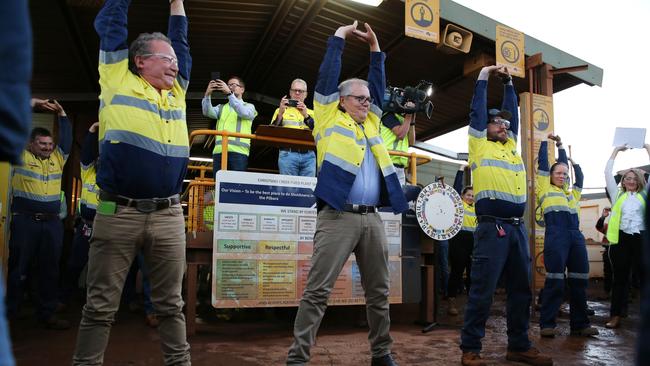Risky business in mandate call is a hard lesson for all
On vaccine mandates, Scott Morrison plays footsie with the ‘freedumbers’ and lets down everyone else.

It made no sense to him, he said, to give people a date that they simply have to hold off having a vaccine to, after which the systems and infrastructure of community vaccination would be dismantled.
Why, he asked reporters, would he do this, when the pandemic wasn’t over, and there would probably be booster shots needed and new variants that might require new vaccines?
Indeed, it does now seem that for the foreseeable future, existing vaccine mandates will need to stay in place, or even broaden, meaning the vast majority of us will be required to keep our personal vaccine status fully up to date. When thinking about the lived experience of the average person, perhaps this is what “living with Covid” actually means; being less disagreeable and more agreeable, by taking on enhanced levels of individual responsibility for our own health, and the health of others. This can be achieved in many ways, including getting required vaccinations on time.
The federal government has been unhelpful on the issue of vaccine mandates. The Prime Minister stands in one state and makes a criticism, and the next day stands in another state, staying silent on the same topic. He plays footsie with the freedumbers, and lets down everyone else, by saying he doesn’t believe in government vaccine mandates, but also supports the right of businesses to introduce them.
This position, which is essentially a shifting of responsibility down the line, helps no one. Overwhelmingly, the business community want all governments to make clear decisions, and provide leadership. Due to legal requirements around health and safety, most companies cannot afford to let the unvaccinated in, and they are on the front line, dealing with the hurt, the rage, and the legal challenges coming in from the anti-vaccine crowd.
Many business operators want to be able to say that they are only implementing government rules. They say this with, for instance, responsible service of alcohol, when refusing service to someone who has had too much to drink. Right now, business owners are grateful for the state premiers, who have at least stepped up and taken responsibility with their health orders.
We have seen businesses introduce mandates, with success, but a widely publicised recent ruling against one large business sent shivers up the spine of many.
Back in October, BHP announced a vaccine mandate for their Mt Arthur mine site. All employees had to have a first dose of an approved vaccine by December 10, and to be fully vaccinated by January 31. Staff had to provide evidence proving their compliance with the instruction by the due dates and any staff who didn’t comply were advised they would be prohibited from entering their workplace.
The CFMMEU (and other applicants) challenged the validity of the instruction, primarily on the grounds BHP failed to meet its consultation obligations in advance of the mandate being issued. The dispute was heard by the Fair Work Commission because – and only because – BHP, in its enterprise agreement, has given the FWC the right to arbitrate industrial disputes in its business.
When the FWC does not have the express right to arbitrate disputes in a workplace, only conciliation is possible, and unions see this as a “talkfest” not worth bothering with.
Readers may remember a hullabaloo over arbitration, in the past. When the Fair Work Act was being designed, business groups were adamant that the legislation should not give the FWC the right to arbitrate workplace disputes. The government of the day made the concession, and took this part out, but since that time the vast majority of companies in the enterprise bargaining system have given the FWC this power anyway.
When considering the BHP mandate, the FWC found that employees are legally bound to follow their employer’s “lawful and reasonable” instructions because this is a term which is implied into all employment contracts. The mandate was deemed “lawful”; but whether it was “reasonable” was subject to more scrutiny.
It was determined that BHP did not meet the consultation obligation imposed by Workplace Health and Safety law, because when the instruction was conveyed it was conveyed as being unchangeable and irreversible; meaning the instruction was “unreasonable”. As such, employees are not required to comply with it.
Of comfort though, the FWC also indicated that the process of consultation can occur again, and that this, if done properly, would result in a valid mandate.
The whole experience has been a setback, and a lesson to all. Businesses can mandate vaccination, but should consult on their intentions to do so first. They should also consider whether giving the FWC the right to arbitrate disputes in their business is a risk they want to take. Business groups should look at their own practices too. It makes no sense to rage against arbitration on a political level, only to give it away later.






Not so long ago, in a statement that laid down a challenge to the mob of “freedumbers” that walk the streets every weekend, annoying people, disrupting commerce and literally spreading disease, Victorian Premier Daniel Andrews made it clear that he wouldn’t be revoking health orders for vaccine mandates.